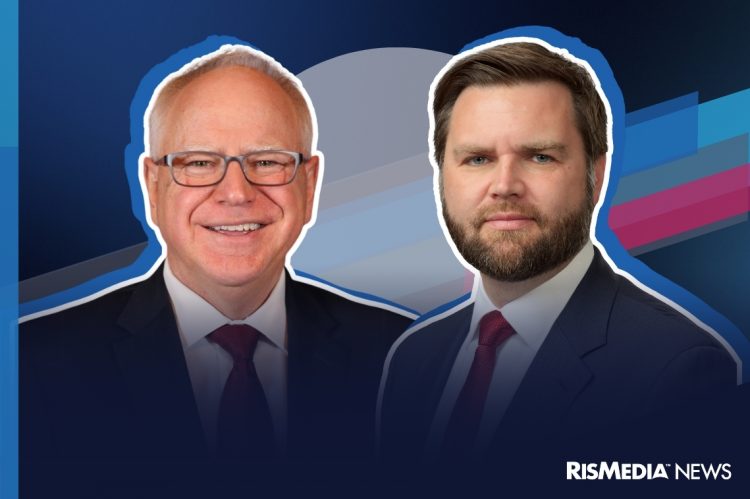Above from left, Tim Walz and J.D. Vance
Housing is starting to become a larger topic of discussion as we get closer to the upcoming presidential election, as seen by the conversation between candidates Senator J.D. Vance and Governor Tim Walz at the Vice Presidential Debate hosted by CBS News Tuesday night.
As those in the real estate industry know, the shortage of homes and the rise of prices has been an ever-present thorn in the side of the market, and many are looking toward policymakers for a solution.
Moderator and CBS News Chief Foreign Affairs Correspondent Margaret Brennan initiated the conversation on housing issues by asking Walz to clarify his and Vice President Kamala Harris’ proposed policies—$25,000 in down payment assistance for first-time buyers, a $10,000 tax credit and building 3 million new homes—posing the question, “Where are you building these homes, and won’t handing out that kind of money just drive up prices higher?”
Walz began by stating that a large problem in the housing market is that there are many who see it as a commodity that can be bought and shifted, but saying he and many others see a house as a place to live. Vance later agreed on this point.
Walz also claimed that the policies he and Harris are looking to put in place have been tested and found successful in his home state of Minnesota, specifically in Minneapolis, which has seen “the lowest inflation rates” and a “12% increase in (housing) stock” due to these policies.
The 12% figure appears to be drawn from a Pew Research study from early this year, which examined how zoning reforms in Minneapolis (some of which preceded Walz’s election to governor) affected the local housing market, finding broadly that policy changes boosted supply, mostly in the form of apartments, while costs stayed low.
In terms of how the money spent on these programs won’t cause a deficit, Walz said that, “People with stable housing end up with stable jobs; people with stable housing have their kids be able to get to school. All of those things in the long run end up saving our money.”
Walz concluded, “We don’t have enough naturally affordable housing, but we can make sure that the government is there to help kickstart it and create that base.”
Brennan then turned to Vance and posed to him a similar question on his and Trump’s housing policies—seizing federal lands to build homes, removing regulations, providing tax breaks and cutting back on immigration—asking, “Where are you going to build all the new homes you’re promising, and what part of any of this plan will provide immediate relief?”
Vance claimed immigration reform is important to housing, alleging that border policy under the Biden/Harris administration has let in millions of undocumented immigrants, which he said leads to high home prices due to increased demands.
“Twenty-five million illegal immigrants competing with Americans for scarce homes is one of the most significant drivers of home prices in the country,” he said.
When asked for evidence on this statement, Vance claimed there was a Federal Reserve study that connects increased levels of illegal immigration and higher housing prices, without specifying what that study was or providing other details.
A study by the Dallas Fed conducted in the summer, which Vance may have been referring to, predicted that “a population influx” created by both legal and illegal immigration “could put upward pressure on rents and house prices, particularly in the short run before new supply can be built.” On the other hand, housing advocates including the National Association of Home Builders and Harvard’s Joint Center for Housing Studies, have touted the importance of immigration in increasing housing supply.
In terms of immediate relief, Vance said that he and Trump have proposed to lower energy prices, stating that “if you open up American energy, you will get immediate pricing release.” He claimed that this plan would also provide relief beyond the housing market.
Addressing the seizing of federal lands, Vance said that there are a lot of federal lands that aren’t being used for anything and could be places to build a lot of housing.
In his rebuttal, Walz took a different perspective and focused on federal lands as serving other purposes, noting that not every state has a lot of federal lands to pursue these building projects on.
Vance then claimed that the current administration, which includes Harris, has made regulations more strict, making it harder to develop resources and build homes. Walz said that he didn’t necessarily disagree with this point, but added that many of these regulations do serve a purpose in safety. Walz also noted that Congress, not the VP, decided these regulations.
Brennan concluded the conversation by saying both candidates are “passionate about the housing crisis” before moving to the next topic of discussion.
For more in-depth coverage of Donald Trump and Kamala Harris’ housing policies, click here.












